Latest Environmental technologies reports

Research 472: Public Participation and Performance Criteria in Strategic Environmental Assessment: The Way Forward to Advancing Practice
Authors: Ainhoa González, Riki Therivel and Gloriana Vargas, December 2024
Year: 2024
Strategic Environmental Assessment (SEA) is an important European Directive that aims to help protect the environment and promote sustainable development, it does this by enabling environmental considerations in the preparation of plans and programmes. Public participation is mandatory under SEA providing an opportunity for knowledge co-creation but participation is generally limited worldwide. It provides a platform to facilitate stakeholders learning, co-design sustainable solutions and inform decision-making. The SEAWAY research project looked to address two practical challenges in SEA implementation, the need for effective public participation and the need for strong key performance indicators to measure SEA effectiveness. This research delivers guidance notes on both public participation and a robust KPI framework to measure SEA effectiveness, in addition to training and video resources for use by planners, government departments and consultants undertaking SEA for public bodies.

Guidance on Strategic Environmental Assessment (SEA) Statements and Monitoring
Year: 2023
This report is an update of the previous stand-alone guidance document on SEA Statements and monitoring, prepared as part of the EPA-funded project Second Review of SEA Effectiveness in Ireland (González et al., 2020). It is specific to the Irish context but has wider international applicability. The monitoring recommendations include guidance on indicators to facilitate a more consistent and coherent approach at this SEA stage. The updates relate to clarifying some SEA monitoring requirements and to acknowledge the published revised national SEA Guidelines and the Development Plan Guidelines for Planning authorities, both published by the DHLGH in 2022.
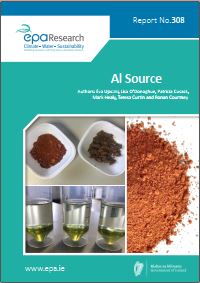
Research 308: Al Source
Authors: Éva Ujaczki, Lisa O’Donoghue, Patricia Cusack, Mark Healy, Teresa Curtin and Ronan Courtney, March 2020
Year: 2020
The scope of the Al Source project is to determine the optimisation of state-of-the-art technologies that could offer potential in the reuse of bauxite residue to recover valuable elements.
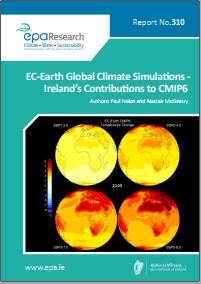
Research 310: EC-Earth Global Climate Simulations: Ireland’s Contributions to CMIP6
Authors: Paul Nolan and Alastair McKinstry , March 2020
Year: 2020
This report provides an overview of future global climate projections as simulated by the EC-Earth Earth system model. The global climate simulations described in this report constitute Ireland’s contribution to the Coupled Model Intercomparison Project (CMIP) (phase 6) (CMIP6) and will be included for assessment in the United Nations Intergovernmental Panel on Climate Change (IPCC) Sixth Assessment Report (AR6)
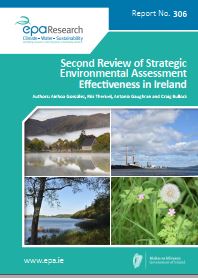
Research 306: Second Review of Strategic Environmental Assessment Effectiveness in Ireland
Authors: Ainhoa González, Riki Therivel, Antonia Gaughran and Craig Bullock, January 2020
Year: 2020
The SEA Directive aims to integrate environmental considerations into planning and decision- making, with a view to promoting sustainable development. However, the extent to which the findings of environmental assessments are informing decisions is not fully understood. This report presents the findings of the second review of Strategic Environmental Assessment (SEA) effectiveness in Ireland.
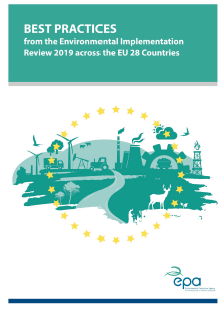
Best Practices from the Environmental Implementation Review 2019 across the EU 28 Countries
Authors: Eileen O’Leary, November 2019
Year: 2019
This report aims to distil out the best practices from the 28-Country EU Environmental Implementation Review 2019 (EIR).
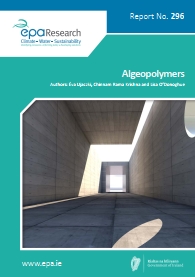
Research 296: Algeopolymers
Authors: Éva Ujaczki, Chinnam Rama Krishna and Lisa O’Donoghue, October 2019
Year: 2019
The Algeopolymers project study focused on a state-of-the-art review related to geopolymers, including the use of wastes and by products as core ingredients in geopolymer products. The objective of the research was to investigate the potential for Irish wastes (fly ash, bauxite residues, etc.) to be used in geopolymer applications and the opportunities for these geopolymer applications within the construction industry in Ireland.
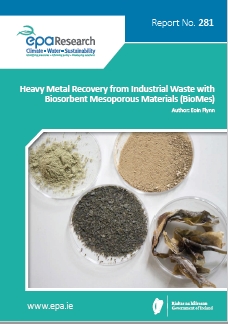
Research 281: Heavy Metal Recovery from Industrial Waste with Biosorbent Mesoporous Materials (BioMes)
Authors: Eoin Flynn, August 2019
Year: 2019
This project presents a method to cheaply produce high-capacity biosorbents from Irish brown seaweeds.
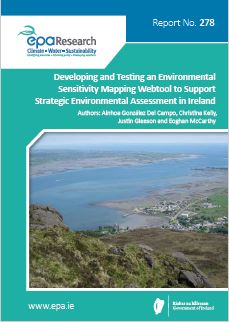
Research 278: Developing and Testing an Environmental Sensitivity Mapping Webtool to Support Strategic Environmental Assessment in Ireland
Authors: Ainhoa González Del Campo, Christina Kelly, Justin Gleeson and Eoghan McCarthy, June 2019
Year: 2019
Environmental sensitivity is a critical consideration in natural resource management. In the context of the legislative requirements for impact assessment, environmental sensitivity (or vulnerability) assessments present a framework for systematically determining the potential for significant adverse impacts.
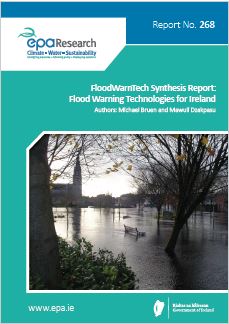
Research 268: FloodWarnTech Synthesis Report: Flood Warning Technologies for Ireland
Authors: Michael Bruen and Mawuli Dzakpasu, April 2019
Year: 2019
FloodWarnTech was an Environmental Protection Agency (EPA)-funded desk study of flood warning, with a specific focus on Ireland. Its objectives were to investigate (1) flood forecasting techniques and systems in use in Ireland and elsewhere; (2) methods and models best suited for use in Ireland; and (3) the optimal use of relevant data sources, observations and forecasts for flood forecasting.
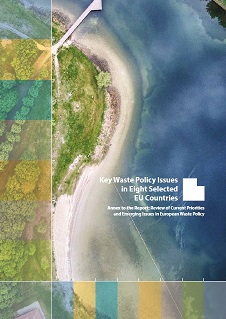
Key Waste Policy Issues in Eight Selected EU Countries
Annex to Review of Current Priorities and Emerging Issues in European Waste Policy, October 2017
Year: 2017
Annex to the Report: Review of Current Priorities and Emerging Issues in European Waste Policy
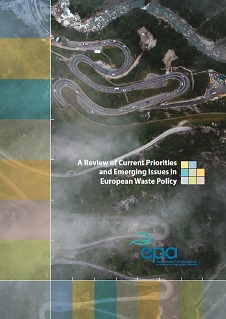
A Review of Current Priorities and Emerging Issues in European Waste Policy
Year: 2017
This report sets out to assess key current issues, and important emerging issues, in the waste policy arena in the European Commission, and in selected Member States.
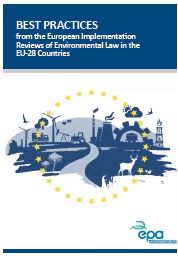
Best Practices from the European Implementation Reviews of Environmental Law in the EU-28 Countries
A report commissioned by the Environmental Protection Agency Research Programme, September 2017
Year: 2017
Best Practices from the European Implementation Reviews of Environmental Law in the EU-28 Countries
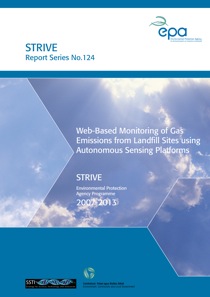
STRIVE 124 - Summary of Findings
STRIVE 124 - Web-based monitoring of gas emissions from landfill sites using autonomous sensor platforms, April 2014
Year: 2014
Autonomous sensor platforms were developed by the research team in Dublin City University (DCU) allowing for long-term continuous monitoring of greenhouse gases and extraction pressure. Web-based accessibility via integrated telemetry facilitated data access and visualisation from remote deployments. These platforms were employed principally on landfill sites.

STRIVE 124 - Web-based monitoring of gas emissions from landfill sites using autonomous sensor platforms
STRIVE 124 - Fiachra Collins, Dylan Orpen, Eoghan McNamara, Cormac Fay, Dermot Diamond, April 2014
Year: 2014
Autonomous sensor platforms were developed by the research team in Dublin City University (DCU) allowing for long-term continuous monitoring of greenhouse gases and extraction pressure. Web-based accessibility via integrated telemetry facilitated data access and visualisation from remote deployments. These platforms were employed principally on landfill sites.
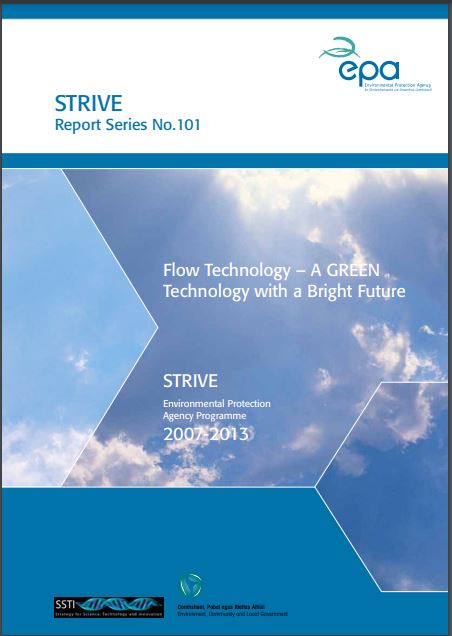
STRIVE 101 - Summary of Findings
STRIVE 101 - Summary of Findings: Flow Photochemistry – A GREEN technology with a bright future , December 2013
Year: 2013
Currently, for every 1kg of active pharmaceutical product produced between 25 and 100kg of waste is generated. This project looks at new technologies that reduce water and energy requirements, offering cost savings and improved product yield, with less waste gnerated.
STRIVE 119 - Summary of Findings
STRIVE 119 - Summary of Findings: Safer Acid Catalysts, December 2013
Year: 2013
This report details our progress towards the development of safer, less toxic and biodegradable chemicals called acid catalysts.
STRIVE 113 - Summary of Findings
STRIVE 113 - Summary of Findings: The use of novel enzymes for the cleaner, greener production of cellulosic bioethanol, December 2013
Year: 2013
The focus of this project was to develop an alternative greener pretreatment method, based on the use of thermoacidophilic enzymes, which aims to improve the efficiency of the pretreatment step and overcome many of the technical, economical, environmental and health & safety related disadvantages associated with current practice.
STRIVE 116 - Summary of Findings
STRIVE 116 - Summary of Findings: Developing Coated Filtration Membranes for Water Purification, December 2013
Year: 2013
This project involved a laboratory scale study into improving the properties of commercial water filtration membranes for removal of metal ions such as copper and chromium from water, forming ion selective smart membranes and the reduction of protein fouling.
STRIVE 114 - Summary of Findings
STRIVE 114 - Summary of Findings: From Doughnuts to Energy: Miniature Enzyme driven Biofuel Cells, December 2013
Year: 2013
The aim of this EPA funded project was to develop cost effective microfluidic platforms for enzymatic biofuel cells.
Research 310: EC-Earth Global Climate Simulations: Ireland’s Contributions to CMIP6
Authors: Paul Nolan and Alastair McKinstry